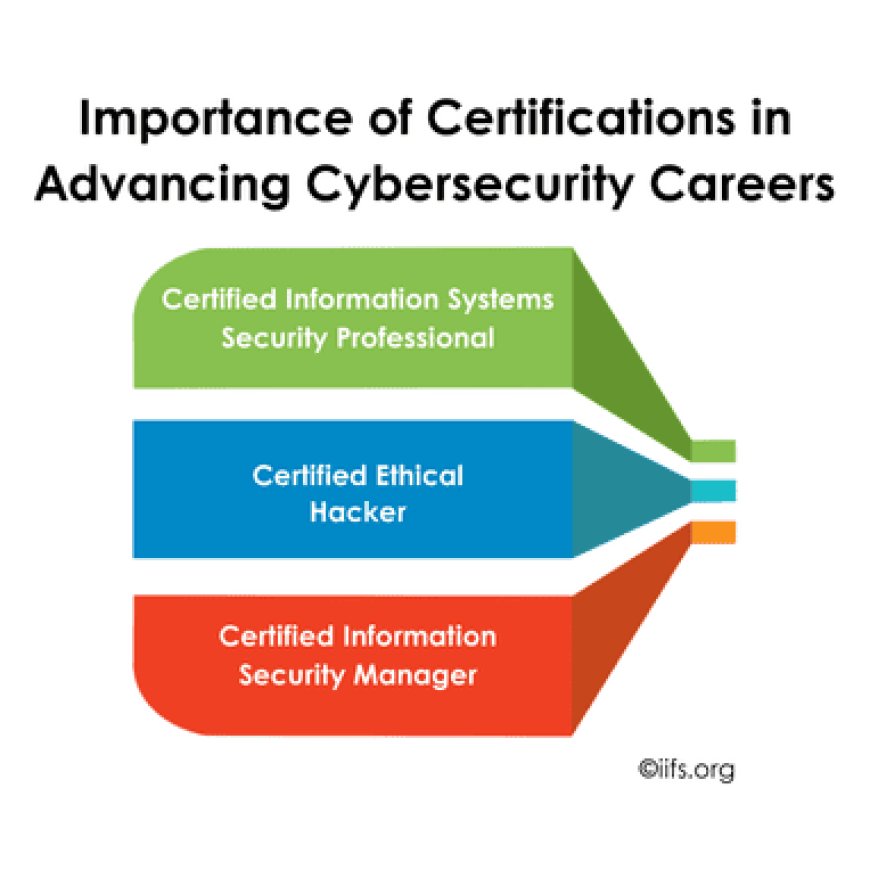Career Opportunities in Cybersecurity
Discover diverse career opportunities in cybersecurity, including roles like Security Analyst, Penetration Tester, and Security Engineer. Learn about skills, certifications, and future prospects in this growing field.

Cybersecurity has become a critical field as organizations increasingly depend on technology. With the rise in cyber threats and attacks, the demand for skilled cybersecurity professionals is soaring. This blog explores the diverse career opportunities within cybersecurity, offering insights into the roles you can pursue and the skills you need to succeed. Whether you're an aspiring tech enthusiast or looking to transition into a new career, understanding the world of cybersecurity careers can help you make informed decisions and take the next steps toward a fulfilling and secure profession.
What is Cybersecurity?
Cybersecurity refers to protecting computer systems, networks, and data from digital attacks, theft, or damage. It involves implementing measures to prevent unauthorized access, ensure the integrity of information, and maintain the confidentiality and availability of data. Cybersecurity encompasses various strategies and technologies, including firewalls, encryption, intrusion detection systems, and security protocols, to safeguard against cyber threats such as hacking, malware, and phishing. Cybersecurity aims to defend against threats and vulnerabilities that could compromise the security and functionality of information systems.
Key Career Paths in Cybersecurity
1. Security Analyst
Role and Responsibilities: A Security Analyst is responsible for protecting an organization's computer systems and networks from cyber threats. They monitor network traffic, analyze security incidents, and implement security measures to safeguard data. Key tasks include conducting vulnerability assessments, managing security tools, and responding to security breaches.
Skills Required:
-
Proficiency in security tools and technologies (e.g., firewalls, intrusion detection systems)
-
Strong analytical and problem-solving skills
-
Knowledge of network protocols and operating systems
-
Familiarity with cybersecurity frameworks and standards
-
Ability to interpret and respond to security alerts
Typical Career Progression: Security Analysts often start in entry-level positions, gaining experience and expertise in security operations. With time and experience, they may advance to roles such as Senior Security Analyst, Security Engineer, or Security Manager. Further career growth could lead to positions like Chief Information Security Officer (CISO) or cybersecurity consultant. Continuous learning and obtaining advanced certifications can also facilitate career advancement.
Security Engineer
Role and Responsibilities: A Security Engineer focuses on designing, implementing, and managing security systems to protect an organization's IT infrastructure. Their responsibilities include developing security policies and procedures, configuring and maintaining security tools, conducting risk assessments, and responding to security incidents. They work to identify vulnerabilities, recommend and implement solutions, and ensure compliance with security standards and regulations.
Skills Required:
-
Expertise in security technologies (e.g., firewalls, VPNs, IDS/IPS)
-
Strong understanding of network protocols and systems
-
Experience with security frameworks and standards (e.g., NIST, ISO 27001)
-
Proficiency in scripting and programming languages (e.g., Python, Bash)
-
Ability to analyze and respond to security threats and incidents
Typical Career Progression: Security Engineers typically start in entry-level roles, such as Security Analyst or Junior Security Engineer. As they gain experience and demonstrate their skills, they may advance to Senior Security Engineer positions. Further progression could lead to roles like Security Architect, Security Manager, or even Chief Information Security Officer (CISO). Career growth often involves specializing in certain security areas, obtaining advanced certifications, and taking on leadership or strategic roles within the organization.
Security Architect
Role and Responsibilities: A Security Architect is responsible for designing and implementing robust security architectures to protect an organization's IT systems and data. Their role involves developing security strategies, creating security frameworks, and integrating security solutions into existing infrastructure. They work on identifying potential security risks, designing security controls, and ensuring that security measures align with business objectives and compliance requirements. Security Architects also collaborate with other IT teams to ensure that security is embedded in all technology initiatives.
Skills Required:
-
Extensive knowledge of security frameworks and protocols (e.g., NIST, ISO 27001)
-
Proficiency in designing and implementing security solutions (e.g., encryption, access controls)
-
Strong understanding of network architecture, operating systems, and databases
-
Experience with risk management and threat modeling
-
Ability to communicate complex security concepts to non-technical stakeholders
Typical Career Progression: Security Architects often advance from roles such as Security Engineer or Senior Security Engineer. With experience, they may progress to higher-level positions like Senior Security Architect or Security Manager. Further career growth could lead to strategic roles such as Chief Information Security Officer (CISO) or Director of Security. Continuous learning, obtaining advanced certifications, and gaining experience in various security domains can facilitate further advancement in this field.
Penetration Tester (Ethical Hacker)
Role and Responsibilities: A Penetration Tester, or Ethical Hacker, is responsible for simulating cyberattacks on an organization's systems to identify vulnerabilities. Their tasks include conducting security assessments, performing penetration tests, and reporting findings to improve security measures.
Skills Required:
-
Proficiency in hacking tools and techniques (e.g., Metasploit, Wireshark)
-
Strong knowledge of network, system, and application security
-
Familiarity with scripting languages (e.g., Python, Bash)
-
Expertise in vulnerability assessment and exploitation
-
Understanding of ethical hacking frameworks (e.g., OWASP)
Typical Career Progression: Penetration Testers often advance to roles like Senior Penetration Testers or Security Consultants. With experience, they may become Security Architects, Cybersecurity Managers, or Chief Information Security Officers (CISOs).
Certifications and Training in Cybersecurity
Importance of Certifications in Advancing Cybersecurity Careers: Certifications play a crucial role in advancing cybersecurity careers by validating your skills, knowledge, and commitment to the field. They help professionals stay updated with the latest security practices and technologies, enhance credibility with employers, and open doors to advanced roles and opportunities. Certifications also demonstrate a level of expertise and adherence to industry standards, making candidates more competitive in the job market.
Recommended Certifications:

-
CISSP (Certified Information Systems Security Professional): Recognized globally, CISSP is ideal for experienced security practitioners, managers, and executives. It covers a wide range of security topics and demonstrates a deep understanding of information security principles.
-
CEH (Certified Ethical Hacker): CEH focuses on ethical hacking techniques and methodologies. It is designed for professionals who want to gain skills in identifying and addressing security vulnerabilities through penetration testing.
-
CISM (Certified Information Security Manager): CISM is targeted at management professionals and covers information risk management, governance, and incident management. It is suitable for those who want to move into managerial roles in cybersecurity.
Training Programs and Courses Available:
-
Online Platforms: Websites like Coursera, Udemy, and Pluralsight offer courses on various cybersecurity topics and certifications.
-
Professional Organizations: Institutions like (ISC)² and EC-Council provide official training programs and preparation courses for certifications like CISSP and CEH.
-
University Programs: Many universities offer degree programs and specialized courses in cybersecurity that cover foundational and advanced topics.
-
Bootcamps: Intensive boot camps and workshops are available for hands-on training and rapid certification preparation.
These certifications and training programs equip professionals with the skills needed to tackle the evolving challenges in cybersecurity and advance their careers effectively.
Emerging Trends and Opportunities in Cybersecurity
Growing Demand for Cybersecurity Professionals: The surge in cyberattacks has spiked the demand for cybersecurity experts across various industries, creating abundant career opportunities.
Impact of New Technologies and Cyber Threats:
-
AI and Machine Learning: Enhances threat detection but introduces new vulnerabilities.
-
Cloud Computing: Offers flexibility but requires strong cloud security measures.
-
IoT: Expands the attack surface with connected devices.
-
Zero Trust Architecture: Emphasizes continuous verification of users and devices.
Future Career Prospects: Career prospects are strong, with roles expanding in specialization and across industries. Key opportunities include positions in cloud security, IoT security, and advanced threat intelligence. Staying updated with trends and obtaining relevant skills are crucial for future success.
cybersecurity offers a wide range of career paths, including roles such as Security Analyst, Security Engineer, Security Architect, and Penetration Tester. Each path presents unique responsibilities and opportunities for growth. Pursuing relevant certifications and engaging in continuous learning are essential for advancing in this dynamic field. For comprehensive information on training and certifications, consider exploring resources provided by IIFIS. Embracing these opportunities will position you for success in the ever-evolving world of cybersecurity.























